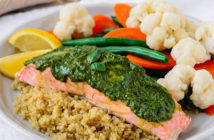Adding the right produce, nuts, and seeds to my diet is my top strategy for good mental health.
Among all the strategies to safeguard my mental health, eating the right foods ties for first (with getting adequate sleep) as the most important. Recently I did some substantial research on which foods promote sanity and which ones send an alarm to your limbic system (emotion center) and cause inflammation. I decided to eliminate gluten, dairy, caffeine, and sugar from my diet. I also started eating fresh produce throughout my day and made the commitment to hit the grocery store a few times a week.
As a result, I feel more emotionally resilient and less vulnerable to the impact of stress and drama on my mood.
Here are some of the foods I eat every day to feel good. They provide the nutrients my body needs to fight off inflammation in my brain, which leads to depression.
Dark Leafy Greens: A Nutrient-Dense Inflammation Fighter

If you were to choose the healthiest food of all, the most nutrient-dense item available to us to eat, it would be dark, leafy greens, no contest. Spinach. Kale. Swiss chard. Greens are the first of the G-BOMBS (greens, beans, onions, mushrooms, berries, seeds) that Joel Fuhrman, MD, describes in his book The End of Dieting — the foods with the most powerful immune-boosting and anticancer effects.
“These foods help prevent the cancerous transformation of normal cells and keep the body armed and ready to attack any precancerous or cancerous cells that may arise,” he writes. Leafy greens fight against all kinds of inflammation, and according to a study published in March 2015 in JAMA Psychiatry, severe depression has been linked with brain inflammation. Leafy greens are especially important because they contain oodles of vitamins A, C, E, and K, minerals, and phytochemicals.
Walnuts: Rich in Mood-Boosting Omega-3 Fatty Acids

Walnuts are one of the richest plant sources of omega-3 fatty acids, and numerous studies have demonstrated how omega-3 fatty acids support brain function and reduce depression symptoms. A study published in the British Journal of Psychiatry is especially interesting. The lead authors ask the question, Why is the vast part biological research — from genetics to psychopharmacology — concentrated on neurotransmitters, when the mammalian brain is approximately 80 percent fat (lipids), and there is a growing body of research demonstrating the critical role of lipids in brain functioning? What’s more, the shift in the Western diet away from these necessary omega-3 fatty acids over the last century parallels the large rise in psychiatric disorders in that time.
Avocado: Its Oleic Acid Gives You Brainpower

I eat a whole one every day in my salad for lunch. Avocados are power foods because, again, they contain healthy fat that your brain needs in order to run smoothly. Three-fourths of the calories of an avocado are from fat, mostly monounsaturated fat, in the form of oleic acid. An average avocado also contains 4 grams of protein, higher than other fruits, and is filled with vitamin K, different kinds of vitamin B (B9, B6, and B5), vitamin C, and vitamin E12. Finally, they are low in sugar and high in dietary fiber, containing about 11 grams each.
Berries: Full of Cell-Repairing Antioxidants

Blueberries, raspberries, strawberries, and blackberries are some of the highest antioxidant foods available to us. I try to have a variety for breakfast in the morning. In a study published in the Journal of Nutritional and Environmental Medicine, patients were treated for two years with antioxidants or placebos. After two years those who were treated with antioxidants had a significantly lower depression score. Antioxidants are like DNA repairmen. They go around fixing your cells and preventing them from getting cancer and other illnesses.
Mushrooms: Helpful Tools to Lower Blood Sugar

Here are two good reasons why mushrooms are good for your mental health. First, their chemical properties oppose insulin, which helps lower blood sugar levels, evening out your mood. They also are like a probiotic in that they promote healthy gut bacteria. And since the nerve cells in our gut manufacture 80 to 90 percent of our body’s serotonin — the critical neurotransmitter that keeps us sane — we can’t afford to not pay attention to our intestinal health.
Onions: Layered With Cancer-Fighting Allium
 You won’t find this item on most lists of mood foods. However, it’s included in Dr. Fuhrman’s G-BOMBS because onions and all allium vegetables (garlic, leeks, chives, shallots, and spring onions) have been associated with a decreased risk of several cancers.
You won’t find this item on most lists of mood foods. However, it’s included in Dr. Fuhrman’s G-BOMBS because onions and all allium vegetables (garlic, leeks, chives, shallots, and spring onions) have been associated with a decreased risk of several cancers.
“Eating onions and garlic frequently is associated with a reduced risk of cancers of the digestive tract,” explains Fuhrman. “These vegetables also contain high concentrations of anti-inflammatory flavonoid antioxidants that contribute to their anticancer properties.” Again, if you consider the relationship between your digestive tract and your brain, it is understandable why a food that can prevent cancers of the gut would also benefit your mood.
Tomatoes: Packed With Depression Fighters

I try to eat at least six baby tomatoes in my salad each day for lunch because tomatoes contain lots of folic acid and alpha-lipoic acid, both of which are good for fighting depression. According to research published in the Journal of Psychiatry and Neuroscience, many studies show an elevated incidence of folate deficiency in patients with depression. In most of the studies, about one-third of depression patients were deficient in folate.
Folic acid can prevent an excess of homocysteine — which restricts the production of important neurotransmitters like serotonin, dopamine, and norepinephrine — from forming in the body. Alpha-lipoic acid keeps coming up as I read more about nutrition and the brain, so I have begun to take it as a supplement, as well. It helps the body convert glucose into energy, and therefore stabilizes mood.
Beans: Satisfyingly High in Mood-Stabilizing Fiber

“Beans, beans, good for the heart. The more you eat, the more you … smile.” They make the G-BOMB list because they can act as anti-diabetes and weight-loss foods. They are good for my mood because my body (and every body) digests them slowly, which stabilizes blood sugar levels. Any food that assists me in evening out my blood sugar levels is my friend. They are the one starch that I allow myself, so on top of a salad, they help mitigate my craving for bread and other processed grains.
Seeds: Small but Mighty Sources of Omega-3s

When I’m close to reaching for potato chips or any kind of comfort food, I allow myself a few handfuls of sunflower seeds or any other kind of seed I can find in our kitchen. Seeds are the last food on Fuhrman’s G-BOMBS list.
Flaxseeds, hemp seeds, and chia seeds are especially good for your mood because they are rich in omega-3 fatty acids. Fuhrman writes, “Not only do seeds add their own spectrum of unique disease-fighting substances to the dietary landscape, but the fat in seeds increases the absorption of protective nutrients in vegetables eaten at the same meal.”
Apples: Ripe With Antioxidants and Fiber

An apple a day could — if eaten with the rest of these foods — keep the psychiatrist away, at least for stretches of time. Like berries, apples are high in antioxidants, which can help to prevent and repair oxidation damage and inflammation on the cellular level. They are also full of soluble fiber, which balances blood sugar swings. A snack I have grown to love is almond butter on apple slices. I get my omega-3 fatty acid along with some fiber.




